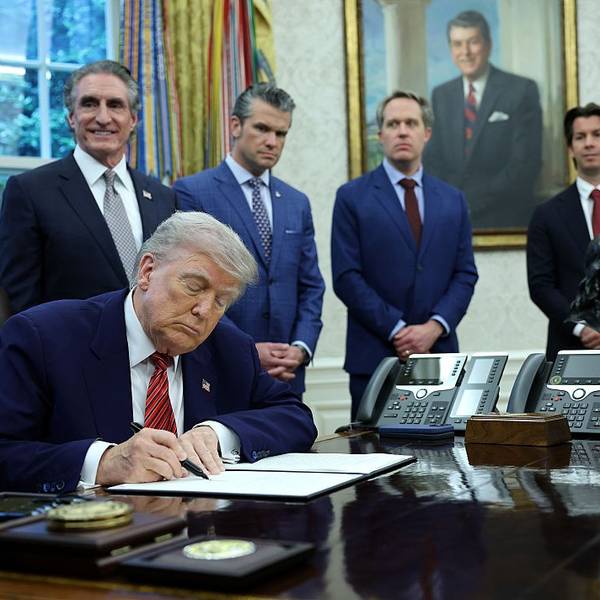Near-Total Meltdown of Fukushima Reactor 2 Confirmed
Researchers say between 70 and 100 percent of fuel inside reactor 2 melted during 2011 disaster
At least 70 percent of nuclear fuel inside one of the reactors at the Fukushima Daiichi power plant melted down following the 2011 earthquake and tsunami, bringing the total of reactors which experienced meltdowns to three, according to a Japanese research team.
In fact, it's possible that 100 percent of the fuel inside reactor 2 may have melted during the disaster, the researchers said over the weekend in Osaka, where they presented the results of their ongoing investigation. The team from Nagoya University and Toshiba Corp. investigated reactor 2 using muons--particles which are deflected by nuclear materials.
The findings, while expected, help move along the decommissioning process, which has been slow due to continued heavy radiation from the reactors. The project is expected to take decades to complete.
Meanwhile, climate groups continue warning of the meltdown's long-term health and environmental impacts, including charges that pro-nuclear Prime Minister Shinzo Abe's administration pushed Fukushima refugees to return to their homes even as radiation in the area remains "so widespread and at such a high level" that it is still unsafe to live in.
In August, Japan restarted a nuclear reactor at the Sendai power plant despite widespread opposition and public safety concerns. Former Prime Minister Naoto Kan publicly protested the move, joining a last-minute rally outside the plant where he warned that Fukushima "exposed the myth of safe and cheap nuclear power, which turned out to be dangerous and expensive."
"Why are we trying to resume nuclear power?" he said.
An Urgent Message From Our Co-Founder
Dear Common Dreams reader, The U.S. is on a fast track to authoritarianism like nothing I've ever seen. Meanwhile, corporate news outlets are utterly capitulating to Trump, twisting their coverage to avoid drawing his ire while lining up to stuff cash in his pockets. That's why I believe that Common Dreams is doing the best and most consequential reporting that we've ever done. Our small but mighty team is a progressive reporting powerhouse, covering the news every day that the corporate media never will. Our mission has always been simple: To inform. To inspire. And to ignite change for the common good. Now here's the key piece that I want all our readers to understand: None of this would be possible without your financial support. That's not just some fundraising cliche. It's the absolute and literal truth. We don't accept corporate advertising and never will. We don't have a paywall because we don't think people should be blocked from critical news based on their ability to pay. Everything we do is funded by the donations of readers like you. Will you donate now to help power the nonprofit, independent reporting of Common Dreams? Thank you for being a vital member of our community. Together, we can keep independent journalism alive when it’s needed most. - Craig Brown, Co-founder |
At least 70 percent of nuclear fuel inside one of the reactors at the Fukushima Daiichi power plant melted down following the 2011 earthquake and tsunami, bringing the total of reactors which experienced meltdowns to three, according to a Japanese research team.
In fact, it's possible that 100 percent of the fuel inside reactor 2 may have melted during the disaster, the researchers said over the weekend in Osaka, where they presented the results of their ongoing investigation. The team from Nagoya University and Toshiba Corp. investigated reactor 2 using muons--particles which are deflected by nuclear materials.
The findings, while expected, help move along the decommissioning process, which has been slow due to continued heavy radiation from the reactors. The project is expected to take decades to complete.
Meanwhile, climate groups continue warning of the meltdown's long-term health and environmental impacts, including charges that pro-nuclear Prime Minister Shinzo Abe's administration pushed Fukushima refugees to return to their homes even as radiation in the area remains "so widespread and at such a high level" that it is still unsafe to live in.
In August, Japan restarted a nuclear reactor at the Sendai power plant despite widespread opposition and public safety concerns. Former Prime Minister Naoto Kan publicly protested the move, joining a last-minute rally outside the plant where he warned that Fukushima "exposed the myth of safe and cheap nuclear power, which turned out to be dangerous and expensive."
"Why are we trying to resume nuclear power?" he said.
At least 70 percent of nuclear fuel inside one of the reactors at the Fukushima Daiichi power plant melted down following the 2011 earthquake and tsunami, bringing the total of reactors which experienced meltdowns to three, according to a Japanese research team.
In fact, it's possible that 100 percent of the fuel inside reactor 2 may have melted during the disaster, the researchers said over the weekend in Osaka, where they presented the results of their ongoing investigation. The team from Nagoya University and Toshiba Corp. investigated reactor 2 using muons--particles which are deflected by nuclear materials.
The findings, while expected, help move along the decommissioning process, which has been slow due to continued heavy radiation from the reactors. The project is expected to take decades to complete.
Meanwhile, climate groups continue warning of the meltdown's long-term health and environmental impacts, including charges that pro-nuclear Prime Minister Shinzo Abe's administration pushed Fukushima refugees to return to their homes even as radiation in the area remains "so widespread and at such a high level" that it is still unsafe to live in.
In August, Japan restarted a nuclear reactor at the Sendai power plant despite widespread opposition and public safety concerns. Former Prime Minister Naoto Kan publicly protested the move, joining a last-minute rally outside the plant where he warned that Fukushima "exposed the myth of safe and cheap nuclear power, which turned out to be dangerous and expensive."
"Why are we trying to resume nuclear power?" he said.

